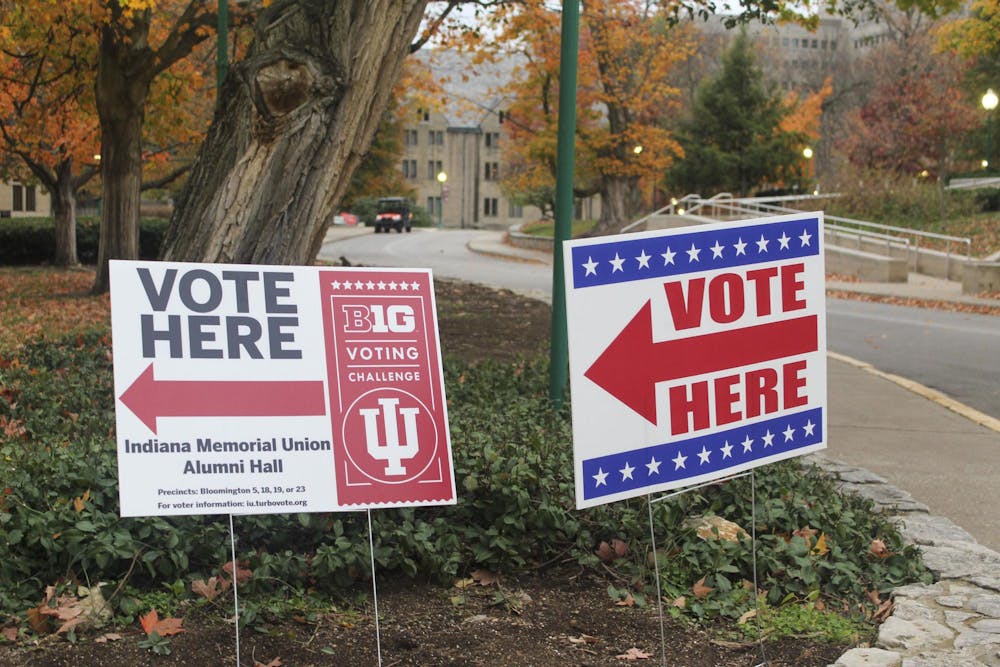Worry, anger and nervous hope. It’s no surprise many IU Bloomington students in one of Indiana’s blue strongholds feel all sorts of negative emotions over Donald Trump’s victory in the presidential race.
The results are surprising to many. They trickled in through the night, amplifying anxiety for many students as the states tilted increasingly toward the former president. The Associated Press called the race at 5:34 a.m., the first thing scores of students saw on their phone as they woke up.
Kaylei Voorhies, a sophomore, said she came into Election Day with high hopes for Vice President Kamala Harris to become the first woman elected to the presidency. She got to sleep around 1 a.m., nervous, her stomach hurting.
“But it was worse this morning when I woke up and turned on my phone and saw the projected results,” she said.
On Wednesday she spoke with other students at a nonpartisan political discourse meeting at the red clock tower by Woodburn Hall, with about a dozen others. The conversations she’s had, with people still willing to fight for what she believes in, have given her some hope.
Still, she’s worried the results represent a threat to America’s democratic institutions.
“That’s a really nerve-wracking thing to think about,” Voorhies said. “His inclination towards some fascist ideals are very concerning.”
Pearl Vinard, a senior, came into the night excited and anxious. She got to bed at 3:30 a.m., mostly due to worry over the results.
She’s the political point person for her friend group, so she’s been getting messages nonstop, asking how she’s feeling, asking what just happened. She spoke with other people too at the red clock tower and said talking face-to-face has helped a bit.
Vinard will spend her last semester in Washington D.C., meaning she’ll be there for Trump’s inauguration in January. To her, the kind of America that will be ushered in that day is uncertain.
“I hope for the best, but I expect the worst,” she said.
Michael Livingston, a senior studying sports media who voted for Harris, said he was confused and anxious over the incoming reality of another four years of Trump.
“I had more faith in our country, and I guess it’s just disappointing to see,” Livingston said.
For Livingston, the issues with the economy that propelled Trump to a second term aren’t the ones that strike closest to home. Concerns with LGBTQ+ and women’s rights are not issues to be voted on for Livingston, they are human rights.
“We’re definitely heading into a darker time,” Livingston said. “It’s scary to see where we’re heading as a whole, and it’s definitely an unknown right now.”
Mouna Nabe, a junior from Indianapolis who voted for Harris, is also disappointed. But she is resolved to keep voting to protect immigrants’ and women’s rights.
“I’m still going to vote in every election, and I’m going to encourage people to vote in every election,” she said. “Every vote counts.”
Bloomington is one of few blue strongholds in the state of Indiana, which voted for Trump by a margin of nearly 20%. About 72 million Americans did wake up to the candidate of their choice. Trump is the first Republican to win the popular vote since George W. Bush in 2004.
In a divided country, it’s often hard to understand why anyone would vote for the other side. For many, voting for the other candidate is a personal attack on the goals and needs of others. Politics is more than laws and taxes — it’s personal.
“It comes from a place of hurt to know that people don’t believe in the same values as others,” Livingston said.
Editor's note: Michael Livingston is a former sports reporter for the IDS.




